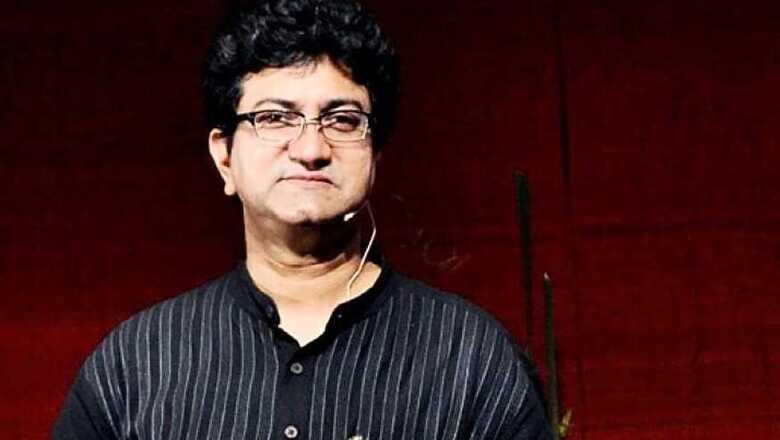
views
It’s tremendously tough to write about a man whose own literary oeuvre is almost too prolific to quantify, or even qualify. From literally lighting up Indian televisions with gloriously crafted advertisements for chewing gum (the Happy Dent campaign, named as one of the top 20 commercials in the 21st Century) to making fully-packed cinemas across the world weep copiously for their mothers because of a song’s lyrics (Maa from Taare Zameen Par, a film for which he won the National Award for Best Lyrics) to making ‘Thanda matlab Coca-Cola’.
We are speaking, of course, of Prasoon Joshi, lyricist, poet, screenwriter, CEO of McCann World group India and Chairman (Asia Pacific), and most recently, Chairperson of Central Board of Film Certification, as of August, 2017. Joshi was present at the News18 REEL Movie Awards ceremony, which took place in Mumbai on Tuesday, where he had a free-flowing dialogue with News18 Consulting Editor, Anuradha Sengupta.
Addressing how he came to accept the onerous role of Censor Board chief in addition to his many other responsibilities, Joshi began, “Whenever a new challenge comes before me, and I feel that there’s a real need for it, I find it very hard to chicken out. So when this responsibility came (to which one can always say no), I decided to take up this challenge and see what I could do to make a difference, in whatever way that I can.”
Speaking of his journey as an artist, Joshi said that he believes everyone is blessed in various ways, whether with creativity or business acumen or anything else. “I’m wired a certain way, but I don’t expect to be treated differently because I write or sing or compose. It’s just how I am. So I don’t take being an artist too seriously. I’m a human being on a journey who uses art as a tool or discipline to explore life and to discover myself and what I’m about, so that’s what I’m doing. I’ve always stumbled upon things. I didn’t what to do with my type of mind until I came into advertising,” he said.
Growing up as a small town boy in the hills of Uttarakhand, Joshi said he spent his time reading and listening to music (both his parents are classical musicians). “From a very young age, I was exposed to authors like (Friedrich) Nietzsche. In fact, after reading Nietzsche for the first time, I wrote my first book, which was published when I was 17. Of course, I didn’t know how to monetize my creativity. I remember, after being published for the first time, my father saying to me, “Dekh liya tumne kitne paise milte hain, kitaab likh ke. I was always writing but I had no idea how to earn my living. It was only when I was doing my MBA, that I came to know about advertising, and that this was somewhere I could fuel my creativity.”
Joshi entered advertising when both it, and television, were at a nascent stage in the country. “Advertising industry needed people who were truly bilingual, who truly understood the masses, the country and came from there because they need to connect. There were products being launched which had a whole new tenor, and so there was this need. So I stumbled upon advertising, as I stumbled in to films. I was not brought up on filmi music. Because of my parents, I was brought up listening to khayal, thumri and music like that. So my vocabulary was from poetry and other classical forms, and I didn’t know there would be takers in the film industry, where my songs will be liked. And so I began writing songs and stories for films. I’ve always stumbled into things because I’m ready to try them out,” he said, adding, “So when this opportunity from the Censor Board came, I thought I should give it a shot and see what I can do.”
Speaking of the dichotomy of being a creator of art and now also a censor of art, Joshi said, “I've always believed that expression and responsibility go hand-in-hand and I think artists understand that; it is in-built. I want a world where a sense of conscientiousness is so deeply ingrained in artists, that there's no need for any intervention. I think that the more you have dialogues about this and try and understand each other’s point of view, then this will be possible.”
That’s not to say it will be smooth sailing all the way. Joshi admitted, “Of course, sometimes I have bizarre experiences. People have taken five girls to a farmhouse and shot for five days and that's something they try to get certified. Everyone has their own ideas of what films are, but you know what kind of content this would be. It's not even art for art's sake, also. That French term, art for art's sake - some people don't believe in it, but I'm a very strong believer and think it's important for art. But this is something else; when commerce comes in.”
“I come from the world of advertising and I know that any product that is made has a certain regulatory body that makes sure that it’s good enough to be presented to people. In the commercial world then, we shouldn’t use this argument of art for art’s sake; that is something very different. So kai baa raise kaam dekhna padta hai, and the balance you’re supposed to strike between responsibility and expression, I think that debate goes on,” said Joshi, concluding that he'd like to live in a world where this debate had ended.
"There’s no country in the world without a body like this (a Censor Board), which means a need for something like this felt. I would rather do what I can so that a conscientiousness exists in the people working there, between them and the filmmakers, a conscientious eco-system if you will, instead of listening only to one party or the other,” signed off Joshi.
















Comments
0 comment